- Home
- Peter S. Beagle
The Folk Of The Air Page 11
The Folk Of The Air Read online
Page 11
Brush and twigs crackled again, but the woman called out in a tone mixing near-hysteria with a certain chattering imperiousness, “Away, touch me not, what are you doing? I mean, I have scribed the pentacle thrice round myself, what are you doing, you dumb dork?” And those were the first clear words that Farrell ever heard Aiffe speak.
The man did not answer immediately; when he did, his speech had already begun to alter, but the laughter continued to prowl in the shadow of each word. “Actually, one time is quite enough for a true pentacle. It’s a circle you’re to weave thrice, and then it wards off nothing a maid with such great lean shanks couldn’t outrun.” A single chuckle sprang past Farrell on soft paws, as though to take up its own independent life in Barton Park. The stranger went on, “Any road—nay, pardon, I’ll have it presently—anyway, the matter’s moot altogether, since your pentacle bites only ‘gainst demons and the like, and good Nick Bonner’s no demon. Not even Will Shakespeare ever called me that—and indeed he spent more time than most trying to devise a fitting name for me.” His voice had been husky as flame when he spoke first; now, with use, it was taking on color and suppleness like a new butterfly, stretching itself, basking in the moon.
Farrell sidled and crouched and skulked until he could see Aiffe facing him almost directly across a strange small grove of burned-out redwoods. Some forest fire had scorched the trees to standing charcoal, gutting them so that they looked like great, black, high-backed chairs dragged up around a table of air. The man was standing in their shadow with his back to Farrell, who sensed more than saw that he made as slight a figure as Aiffe herself and that he was naked.
Aiffe was recovering herself rapidly, forcing a bold dignity that Farrell had to admire. She said, “The pentacle’s there because I happened to be summoning a demon. If you aren’t one, you can just go back where you came from. I don’t want you.” She added several halting words in what Farrell assumed to be Latin.
The laughter flowered brightly between them, and Aiffe took a step backward, touching her face. The stranger said happily, “Dear squirrel, dear coney, dearest little partridge, it would take such priest-cackle as great Innocent himself never knew to send Nicholas Bonner around the block. I’ve not been for anyone’s bidding since Master Giacopo Salvini died at the stake in Augsburg—and there was a man had demons sweeping his hearth and currying his fine horses.” He whistled softly and chuckled again. “Ah, but forty men-at-arms came to curry him, and he’d not time to ask his lackwit niece what sweet Nick had promised her in the dark of the chimney corner. And with him went up the only words could ever command my spirit, and the rest is all freedom. Child, there’s jabber binds Lucifer to obey that wouldn’t do up a collar button on Nick Bonner.”
Even at that distance, Farrell could see that the thin girl was trembling, but she answered coolly, “You’re such a liar. Somebody sent you back out into limbo, or wherever you go, and you had to stay there until I called you. You’re nothing, I still want a demon.” Her voice was the lute’s voice, poignant and shifting, with coins and little drums in it, and a rubber-band whine.
The man dropped lithely down onto his bare heels, hugging himself and rocking as he cried, “Oh, well hit, fair on the mazzard, squash on the old beezer. What an excellent savory talk is this of yours, after all.” His own speech was fast shedding its daintily wicked music; Farrell could hear the vowels collapsing like pricked balloons, and the lilting drawl being overtaken by the concrete consonants of Cedar Rapids. Nicholas Bonner said, “Well, you’re wondrous foolish, but not altogether fool. True enough, the last flaming breath of Master Giacopo did consign his betrayer to such night and silence as had me near weeping to join him in cozy hell. Oh, he knew how to venge himself, no man better—I’d found that out while he was yet alight.” The same freezing, measureless despair blew through his voice for a second time and was gone.
“So if it hadn’t been for me,” Aiffe said. Farrell was too far away to read her expression, but he saw the difference in the way she stood, pushing back her heavy hair. She said slowly, “So you owe me one, don’t you? You really owe me a big favor.”
Nicholas Bonner laughed so hard this time that he had to prop himself with his hands to keep from falling over. “Now truly, that deserves my best effort at the local tongue.” He cleared his throat, still squatting in the moonlight with his hands flat on the ground, like a golden frog. “Kiddo, just by not being a demon I’ve done you a better turn than anyone’s had from me in a thousand years. Let me tell you, if you’d caught the notice of the humblest, feeblest, most wretched midge of a demon that was ever spawned—girl, the least of those would have swarmed up your two-bit charm like a ratline and swallowed you whole before you could wet your pants. Oh, we’re more than quits, take my word for it.”
“If I took people’s words for things, you wouldn’t be here,” she answered. “Just don’t worry about me, all right? I take care of myself, I can handle anything I can summon.” Her hands were closed at her sides, and she leaned toward the crouching man. She said, “I’ve used that spell three times, and each time something’s moved, somebody’s come to me. Not a demon—okay, I haven’t got that down yet—but I always get somebody. I’m Aiffe, you snotty dork Nicholas Bonner. I can make things move.”
Nicholas Bonner stood up then. His naked body cast a pale, crooked moonshadow behind him. Farrell watched it wriggle toward him past the blackened redwood stumps; when it touched his ankle, he was certain that he could feel himself connected to Nicholas Bonner, spine linked to spine, like electrodes. He tried to step away from the shadow, but it moved with him as if it were his own.
“Aye, so you can,” Nicholas Bonner said to Aiffe at last. His voice had turned thoughtful and cautious, and there was no laughter in it now. He said, “Indeed, you do have a sort of skill, and no denying it. But to what end, that’s the issue—to what end?” When the girl did not answer him, he continued impatiently, “Come on, sport, talk up. What do you want that you think a demon could give you?”
Aiffe giggled quite suddenly, shrill as a tree frog. “I want to mess with people,” she said. “I just want to get even, that’s all.”
Farrell felt Nicholas Bonner smile then; the warmth spread through him thinly, like one of the tingling guilts of childhood, forcing him to smile, too. Nicholas Bonner said very gently, almost wonderingly, “Why, we are well met.” He held out his arms to her and moved lightly across the redwood grove, and his shadow danced after him.
She did not back away this time, but Farrell did, free of Nicholas Bonner’s shadow and of any desire to watch them further. He duck-walked clumsily until he was clear of the trees, then stood up, shook himself, turned and blinked straight into the chestnut-brown eyes and small, closeclipped beard of the black Saracen. The Saracen said politely, “Ah. There you are.”
“I doubt it,” Farrell said sincerely. Behind him, in the redwood grove, Aiffe laughed twice, sounding frightened and happy. The Saracen seemed not to hear her. He said, “Hey, the noble multitude stompeth and yelleth for encores. Time for your second set.”
Farrell grinned until his face hurt, absurdly grateful to see him. “What happened to the castle talk? You could lose your union card, talking like that.”
“I’m a bard, man,” the Saracen said. “They make allowances for me. I give them whole ballad cycles in Gaelic, Arabic, Welsh, Danish, Old English, Anglo-Norman, and great big chunks out of Carmina Burana. They make allowances.”
Aiffe’s laughter ended in a sharp, lonely cry; but the Saracen already had an arm through Farrell’s arm and was turning him back toward the clearing, chatting easily and pleasantly all the while. “Bards have it made, anyhow. Catch one of the bardic festivals, you’ll see what I mean. Everybody else has to stay in character, but if you’re competing, hell, you get to do Eskimo Nell, Stagolee, anything you want. One time I recited this whole huge epic about King Kong, did it all in iambics and terza rima. Took me damn near an hour to get through.”
He kept up
a graceful patter of conversation as they walked, volunteering, among other things, that he had been a charter member of the League for Archaic Pleasures. “Me and Simon, Prester John, Olaf, maybe a dozen assorted Middle Ages freaks, all swashing away at each other in Garth’s backyard. No rules, no structure, just get together now and then and go at it. I mean, we had folks making morgensterns out of croquet balls and bicycle chains in those days, using car antennas for flails. So there had to be some rules after a while, and then people started in bringing their families, and there had to be something for the women to do. The League would never have happened without the women.”
Farrell said, “But the fighting’s still what matters.”
The Saracen shook his head. “Not the way you mean. We’re a theater, we give someone like Elizabeth a stage where she gets to be one bad, sexy, mysterious Blood Countess from Transylvania—and believe me, she is none of the above as a regular thing. Or you take Simon Widefarer. Simon’s a lawyer, contracts or something. Hates it. Hates himself for being scared to tell his parents he didn’t want to be a lawyer, hates himself for being scared to quit cold and start all over running some shoestring airline in Belize. But here—here he’s a condottiere, a free captain, best fighter in the League after Egil Eyvindsson, and he’s not afraid of anything. All we do, we give him a place to be Simon Widefarer on the weekends.”
“Do you have a place for Nicholas Bonner?” Farrell asked quietly. The Saracen smiled as vaguely and benignly as though he had not quite heard the question and could not bring himself to admit it; but his arm jumped once against Farrell’s, and his effortless amble quickened slightly. Farrell asked, “Who are you? What does this handy little repertory company give you?”
The Saracen wagged a forefinger and frowned with such elegant severity that Farrell had no idea whether he was being admonished, reproached, or very strangely teased. “Two entirely different questions, my good minnesinger. Who I am is a black man fool enough to have a classical education, and there are a lot of people at this dance wouldn’t even tell you that much about themselves. Sort of like the Gold Rush, you know, you don’t want to be asking somebody what his name was back in the States. Names are magic, names are all the magic there is, every culture knows that. Got any sense, you don’t even let the gods know your right name.”
He halted suddenly and smiled at Farrell in quite a different way—the thin, bulging grin of something that might eat grubs and shoots and blackberries most of the time, but not always. “But who I am here is Hamid ibn Shanfara, poet and son of an outlaw poet, historian, storyteller, Royal Keeper of the Lists and Legends. Some places south of the Sahara, they’d call me a griot.” His small, smooth bow exactly followed the curve of the dagger hanging at his waist.
“Another rememberer,” Farrell said. “We are well met.” Only the chestnut eyes showed the least reaction to Nicholas Bonner’s words.
Hamid said lightly, “Beats teaching. I guess I could have taught all that stuff I know somewhere, but I never wanted to. I didn’t learn it to teach. I just wanted to be it, which is hard to explain to people.” He began walking again, glancing sharply sideways at Farrell. “Like you and the lute, yes?”
“Like me and the lute,” Farrell said. “Like Aiffe and witchcraft, yes?”
Hamid did not answer until they had almost reached the clearing. There was a new dance going on, a branle by the music and the scrambling laughter. Hamid said finally, “Well, that’s a role too, same as a bard or a troubadour. Hyperborea, up in Sacramento, they’ve got one lady who’s into wicca, the Old Religion, whatever you want to call it. Looks like a filing cabinet and makes witchcraft sound like organic mulching. The Kingdom Under the Hill has witches up the yingy, mostly reading auras, predicting earthquakes. We’ve got Aiffe.” He hesitated, letting go of Farrell’s arm to concentrate on resettling his handsome indigo turban. “Now I don’t know what you saw her fooling with back there—”
“That’s the trouble,” Farrell said sadly. “I do.” The Saracen was definitely walking faster now, making for the dancers, and Farrell lengthened his own stride to keep up. He said, “Hamid, we don’t know each other, I’m just passing through, this is not my concern. But what you guys have there is no cultural-anthropology drop-out planting string beans naked in the full moon. What you have there is Baba Yaga.”
Hamid snorted without looking at him. “Man, Aiffe’s like a mascot, she grew up with the League. She’s been playing sorceress since she was a little kid.”
“I think she’s about got it down.” Farrell said. “Look, I would really, truly like very much to believe that she and her boyfriend were rehearsing the class play, or even getting in shape for some local fertility ritual. Or that I was hallucinating somehow, or just getting it wrong, the way I do.” He caught hold of Hamid’s white linen robe to stop him for a moment. “But this one time I can’t talk myself into it. I know what I saw.”
At the tug on his robe Hamid turned swiftly and struck Farrell’s hand away, saying with a sudden menacing sweetness, “Don’t grab at a bard, you don’t do that ever.” There was nothing of the scholar, the clown or the courtier about him now; he might have been a desert priest, like a brown snarl of barbed wire, confronting true blasphemy. He whispered, “You don’t known what you saw. Believe me.” Farrell could barely make out his words under the music. Hamid said, “She shows off, that’s all, she likes attention. She’s fifteen years old.”
“The real witches and wizards were probably young,” Farrell said thoughtfully. “I never wanted power as much as I did when I was fifteen.” But Hamid was gone, abruptly vanished into a glowing tumble of dancers who overflowed the clearing and spilled around Farrell, gasping and whooping and falling down. Garth de Montfaucon stalked by, mantis-graceful, mannerly as death. Farrell nodded slightly, and Garth smiled like a zipper and moved on along the way Farrell had come.
Julie was standing near the musicians’ dais, talking with the Lady Criseyde, but she went to Farrell as soon as she saw him and hugged him quickly. “Where have you been?” she asked. “I was worried, where did you go?”
“Just walking a little,” Farrell said. “I’m sorry, I should have told you.”
“I didn’t know where you’d disappeared to,” she said. “You were just gone suddenly, and so was she—Aiffe—and Garth’s been sliding around everywhere like butter in a skillet, really hunting for her. I thought you might have gotten kidnapped; somebody might have been sacrificing infants. Virgins.” She laughed, but there was a shivering tinfoil sound to it, and she was slow to let go of him.
“Mostly I was hunting for Ben.” He hesitated, trying to find a way to begin telling her about the laughter under the trees. The Lady Criseyde said, “If you seek the Viking Eyvindsson, you might do well to find my own lord, the Falconer. They two are as near to being companions as Egil will allow.” She had a low, precise voice and the wary grace of a creature hunted only in certain seasons.
“I’ll check,” Farrell said shortly, startled to feel a mean high-school squeeze at the thought of Duke Frederik being Ben’s preferred friend in this world. He said, “Tanikawa, Jewel, I have to talk to you,” but both Julie and the Lady Criseyde were staring past him, unhearing, leaning forward with their mouths slightly open. Farrell turned, knowing what he was going to see and hoping he was wrong.
A little way from them, the girl Aiffe was leading a boy of her own age into line for a new pavane. He was as slender as she and perhaps half a head shorter, but he carried himself with a bold lilt that made him appear to look down at her. In the torchlight, his hair was impossibly yellow—dandelion-thick, so ridiculously, insultingly rich and molten as to make the moon look like pale margarine—though his skin was a smooth, sallow, olive color. He was dressed all in green, from his surcoat to his hose, wide belt, and shoes, and Farrell thought inanely, Of course, if she can call him here from wherever he was, she can damn sure put some clothes on him. Aiffe was smiling, holding the boy’s arm tightly with both hands.
/> The Lady Criseyde said softly, “Now that’s none of ours, that’s no child I’ve seen before.” The yellow-haired boy whispered to Aiffe, making her giggle and rub her shoulder against his. They had a curious air of brother and sister about them; they might have been conspiring to play a trick on a roomful of overfed uncles and aunts. Aiffe could not stop smiling.
“The Kingdom Under the Hill,” Julie suggested. “They turn up here all the time.” The musicians began to play Cutting’s Pavane far Mistress Knollys, and Nicholas Bonner made a reverence to Aiffe that reminded Farrell of the tense little wriggle of a flame. She snickered again and curtsied like a stork settling down on a chimney.
The Lady Criseyde had slipped away to pick up her drum and join the music. Julie moved close to Farrell, taking his hand. Nicholas Bonner danced with Aiffe like a flame taking a deeper, brighter hold on a log, digging in. As grave and demure as his dance was, Farrell could feel the sweet, burning laughter crackling in each movement, barely contained, roiling joyously under the solemn skin of the pavane. He heard the terrible thankfulness as well, and the husky voice greeting itself under the trees: “Arms, legs, senses, fancies, follies…”
“He’s not from California,” he said. “Believe me.” When he turned to Julie, her face was the color of city ice. Farrell raised the hand she was gripping to touch her cheek and felt her grinding her teeth in a failing effort to keep them from chattering. He said, “Jewel,” but she would not look at him.
The pavane ended, and Nicholas Bonner quickly imitated the other dancers’ grand reverence to the musicians; but Aiffe, as before, remained insolently erect, even tugging at Nicholas Bonner’s hand to pull him up again. Abruptly she released him and came walking straight toward the dais where Farrell stood with Julie. Nicholas Bonner followed at the pace of the pavane, still dancing serenely by himself. Aiffe stopped before Farrell and grinned at him, pushing her hair back from her shiny forehead.

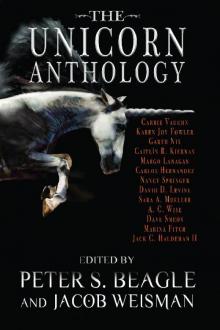 The Unicorn Anthology.indb
The Unicorn Anthology.indb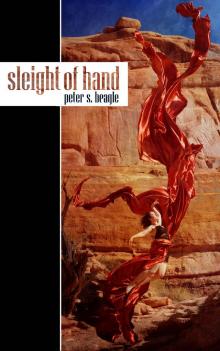 Sleight of Hand
Sleight of Hand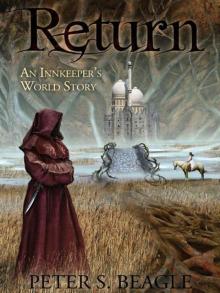 Return
Return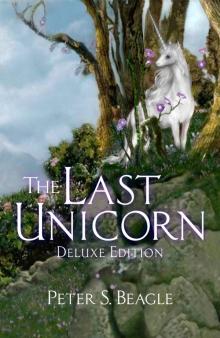 The Last Unicorn
The Last Unicorn Two Hearts
Two Hearts Mirror Kingdoms: The Best of Peter S. Beagle
Mirror Kingdoms: The Best of Peter S. Beagle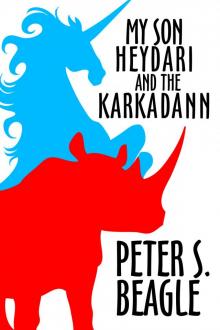 My Son Heydari and the Karkadann
My Son Heydari and the Karkadann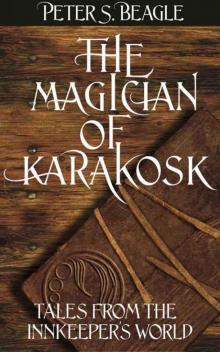 The Magician of Karakosk, and Other Stories
The Magician of Karakosk, and Other Stories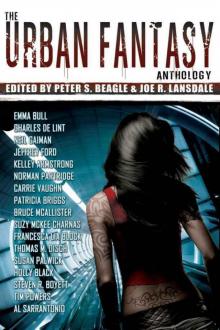 The Urban Fantasy Anthology
The Urban Fantasy Anthology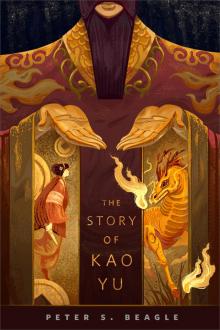 The Story of Kao Yu
The Story of Kao Yu The Karkadann Triangle
The Karkadann Triangle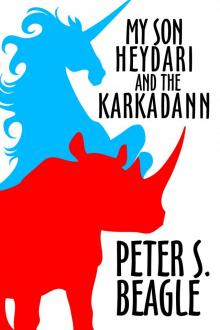 My Son and the Karkadann
My Son and the Karkadann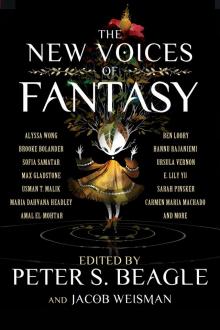 The New Voices of Fantasy
The New Voices of Fantasy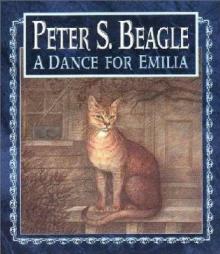 A Dance for Emilia
A Dance for Emilia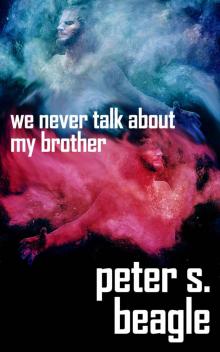 We Never Talk About My Brother
We Never Talk About My Brother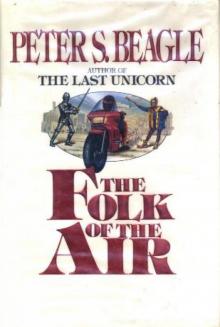 The Folk Of The Air
The Folk Of The Air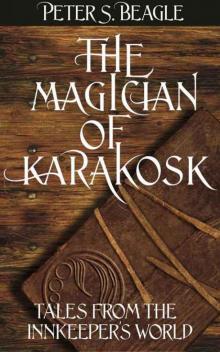 The Magician of Karakosk: Tales from the Innkeeper's World
The Magician of Karakosk: Tales from the Innkeeper's World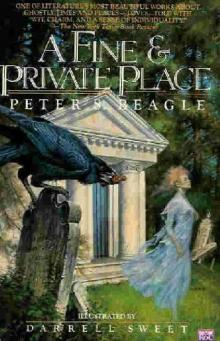 A Fine and Private Place
A Fine and Private Place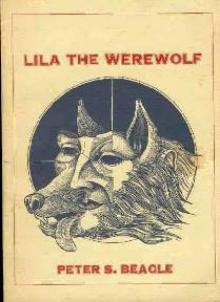 Lila The Werewolf
Lila The Werewolf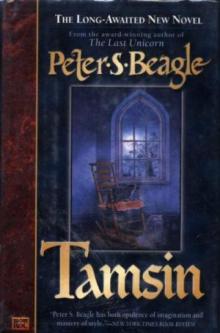 Tamsin
Tamsin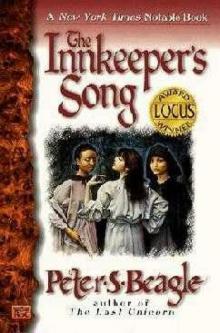 Innkeeper's Song
Innkeeper's Song